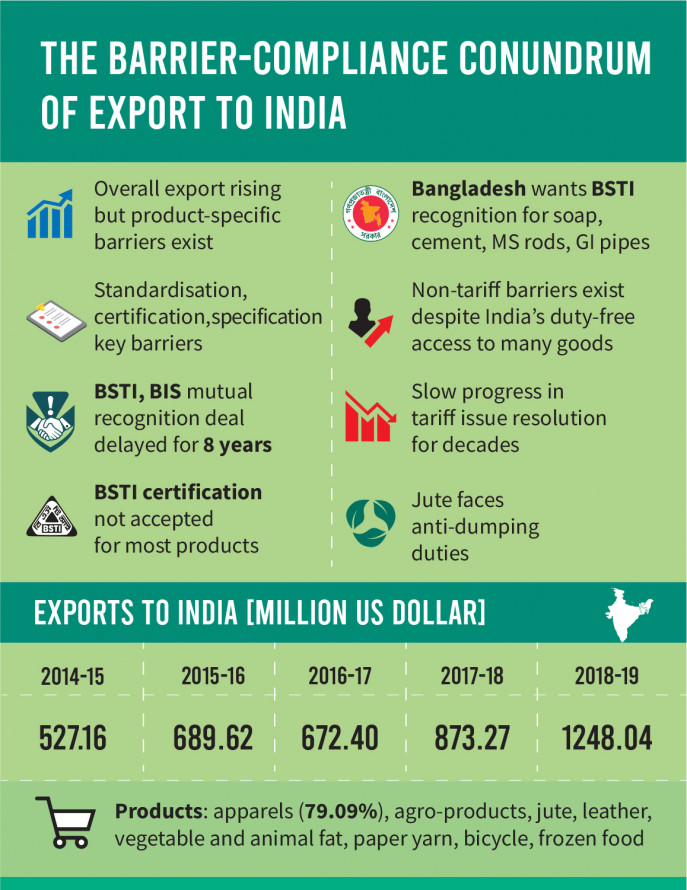Trade barriers, or non-compliances – what limits export to India?
There is great disparity in the two-way trade. India exported around $8.63 billion worth of goods to Bangladesh in the 2017-18 fiscal year, with Bangladesh exporting only $0.87 billion worth of goods to India in the same period.

Certificates from India's agencies like Standardisation, Testing and Quality Certification (STQC), National Accreditation Board of Testing and Calibration Laboratories (NABL) are needed for Bangladesh's exports to India.
BSTI certification is not accepted for most products. India asks for third party accreditation.
There is a lack of harmony in the standards set by Bangladesh's BSTI and India's BIS in sanitary and phytosanitary products that also makes it hard for exporters to comply with.
Standardisation, certification, specifications are the issues that stand in the way of Bangladesh's exports to India.
Bilateral trade is heavily tilted in India's favour.
There is great disparity in the two-way trade. India exported around $8.63 billion worth of goods to Bangladesh in the 2017-18 fiscal year, with Bangladesh exporting only $0.87 billion worth of goods to India in the same period.
Export to India marked a 43 percent growth to $1.25 billion in the last fiscal year till June, on the back of increased demand from global brands who opened more outlets in India and sourced more from Bangladesh.

India offers duty-free access to many goods. But non-tariff barriers exist, limiting further export growth.
Non-tariff, para-tariff and technical barriers to trade have been in official talks for decades. There has been some improvement, but this has been very slow.
On Tuesday, commerce minister Tipu Munshi raised the issues at a meeting in the Indian state of Assam.
He urged India to remove all tariff and non-tariff barriers which limit Bangladesh's export to its next-door neighbour.
It's a positive sign that Bangladesh's export to India is on the rise. But at the same time new barriers emerge impeding product-specific export, said Khondaker Golam Moazzem, research director of the Centre for Policy Dialogue, a research organisation.
Sometimes these barriers are related to standardisation, sometimes to certification or to technical issues, he pointed out.
India earlier agreed to endorse the standardisation of the Bangladesh Standards and Testing Institution, but only a few items have been acknowledged so far.
The number needs to increase. India can offer technical assistance in this aspect, Golam Moazzem suggests.
In 2007, the interim caretaker government had approved a memorandum of understanding between Bangladesh Standards and Testing Institution (BSTI) and Bureau of Indian Standards (BIS) for mutual recognition of each other's certification. It was cited as the first step to remove non-tariff barriers.
But the agreement was signed in June 2015, eight years later.
India now recognises BSTI certification for 21 products. No test certification is needed for solar panels.
Bangladesh wants recognition of BSTI certification for more products including soap, cement, MS rods and GI pipes, which could boost exports to India.
Ali Ahmed, chief executive officer of the Bangladesh Foreign Trade Institute (BFTI), said, "Trade barriers with India are decreasing. We're studying to see where barriers still exist and how to get rid of them."
"The BSTI needs an upgrade. We need to have a modern standardisation agency to keep up with our export growth," he said.
Bangladesh's jute now faces anti-dumping duties in India.
India had imposed anti-dumping duties on the export of lead acid batteries from Bangladesh. The controversial duty was lifted after three years in 2005 following an appeal to the WTO by Bangladeshi exporter Rahimafrooz.
BFTI chief executive Ali Ahmed said anti-dumping on jute is not a barrier, it is a trade dispute which needs to be settled through due process stipulated by the World Trade Organisation rules.
In such cases, affected private parties are required to appeal to the WTO with assistance from Bangladesh's mission in Geneva.
Former director of FBCCI Manzur Ahmed says there are trade barriers, but many of those originate from supply-side problems, like lack of global trade compliances.
Our business community and trade-related authorities need to meet those compliances, he says.
Non-compliance in standardisation, specification and certification make our products vulnerable to non-tariff barriers. If we don't fix them, we'll face problems in trade not just with India, but with all other countries as well," he pointed out.
If any trade barriers go against international trade rules, they can be mitigated through negotiation. There have been such instances with India in the past. In case of trade barriers with valid reasons, the only way is to ensure compliance, which are global obligations of trading partners, explained Manzur Ahmed, who advises the apex trade body on tax and tariff issues.


 Keep updated, follow The Business Standard's Google news channel
Keep updated, follow The Business Standard's Google news channel














